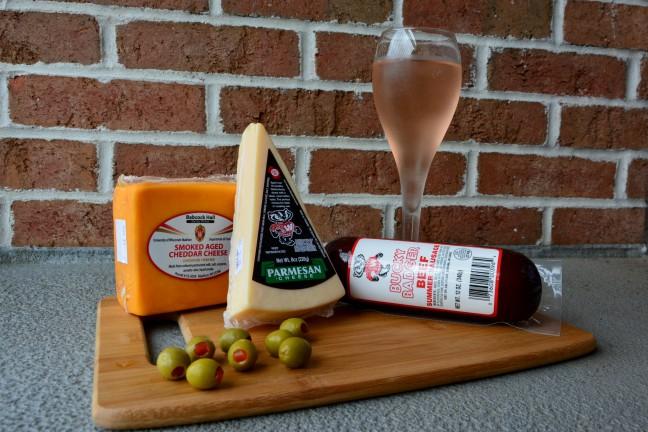Over 60 million Americans experience digestive issues in their lifetime. While it may not seem serious, 12% of inpatient procedures ensue from poor gut health. In fact, a review in Sleep Medicine Reviews noted an imbalance in gut health leads to increased sleep problems, skin irritation and bad breath.
University of Wisconsin associate professor of bacteriology Garret Suen said a diverse community of microbes with multiple capabilities is often characteristic of good gut health. Suen said this robust and diverse microbiota community protects the gut from invasion from pathogens, such as food poisoning. Most importantly, he said these gut microbes allow the body to acquire necessary compounds and nutrients not normally attainable.
‘Year in Space’: Astronaut Scott Kelly shares his story at Memorial Union
Other functions of microorganisms residing in the digestive system include breaking down consumed foods, extracting nutrients and regulating the amount of “bad” bacteria in the gut. Low microbiome diversity has been shown to correspond to numerous non-communicable diseases such as diabetes, cardiovascular diseases, cancers and chronic respiratory diseases.
Gut microbiota may not be common knowledge for individuals. Researchers have delineated a strong interest in fermented foods as a key driving force in maintaining gut health.
Department of Food Science assistant professor Victor Ujor specializes in fermented foods and beverages, with a background in synthetic biology and fermentation sciences. He believes the interest in fermentation is driven by the desire to eat more organic foods.
“There is a big realization that some things that we ferment and eat will give ourselves a chance at having more nutritional value from them,” Ujor said.
Hobby to science: How tracking seasons blossomed into climate science
The process of fermentation itself is unique in its universality. Fermentation is used for preserving and adding flavors in foods, creating biofuels and even contributing to medicine. For instance, Ujor said fermentation is utilized in manufacturing yogurt, cheese, soy sauce, sauerkraut and kombucha.
But, for being such a versatile scientific process in terms of the food it creates, fermentation is meticulous. Ujor said it requires following the exact same procedure each time to maintain the same flavors of these foods. Factors such as the amount of microorganisms added, temperature and the pH of the environment can impact the fermentation process and distort the flavors of the product.
“Fermentation in food helps us acquire certain nutrients and amino acids not readily available while stripping away unwanted chemicals such as cyanide from foods that affect our gut health,” Ujor said.
In other ways, fermentation can even be integrated in medicine by creating insulin to help cells in the body absorb blood sugar. Yet another study found a 10-week diet high in fermented foods greatly improves one’s immune response and microbiome diversity in the gut.
Consuming probiotics is an equally praised method of maintaining gut health. Probiotics have been known to help fight off bad bacteria, create vitamins for the body and prevent bad bacteria from entering the bloodstream.
Consuming probiotics can be especially helpful in situations such as having food poisoning by restoring some of the microorganisms in the gut. Suen said cytotoxins produced by food-poisoning-associated microbes can wipe out an entire microbiome.
Though there are many benefits to consuming probiotics, many misconceptions still exist about how effective they really are for gut health and the results they provide.
From citizen to scientist: How anyone can advance scientific research
Associate professor of Food Science Jan Peter van Pijkeren said probiotics are not all the same and have a lot of strain variability. He said the effectiveness of each probiotic will depend on the consumer’s microbiome and mixture of probiotics — what is effective for one individual may not be for another.
But, this should not discourage individuals from consuming probiotics to maintain gut health. Van Pijkeren said probiotics do work for a lot of people, but one type of probiotic may not work as effectively for another individual. Suen also said there is a lot of variability in probiotic efficacy, which emphasizes the uncertainty present with gut health and consuming certain foods.
“Because everyone’s microbiome and genetics are different, you have no idea what the impact is going to be,” Suen said.
In reality, microorganisms in the gut are extensively diverse in their ability to inhabit different conditions, influenced by the foods consumed by the individual, van Pijkeren said. Bacteria require many ingredients and components to thrive.
To support multiple organisms, it is believed to be essential to diversify one’s diet, Suen said. He said a diet consisting of a combination of sugars, fibers and proteins will lead to a more diverse community and, in turn, maintain the ecosystem in the gut. In contrast, Suen also said a relatively less diverse microorganism community will most likely ensue from consuming a diet solely based on processed foods and sugars.
In the end, there is no sole cure for creating a “healthy gut” to prevent illnesses, Suen said. He said trying new things, however, whether fermented foods or probiotics, does not hurt. In fact, it is equally as important in determining what methods beneficially influence an individual’s gut health, Suen said.
“We are still learning a lot in terms of what healthy truly means,” van Pijkeren said.


















